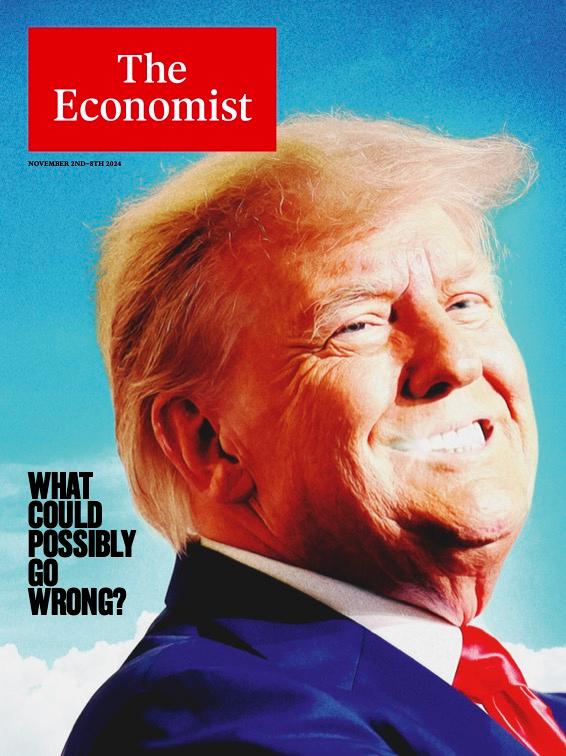The Scoop
The Economist is taking advantage of the space vacated by US news outlets including The Washington Post, Los Angeles Times, and USA Today, and endorsing Vice President Kamala Harris in the 2024 presidential election.
“It is hard to imagine Ms. Harris being a stellar president, though people can surprise you. But you cannot imagine her bringing about a catastrophe,” The Economist writes, in an essay addressed at reluctant, Economist-reading Trump supporters who are “deluding themselves” about the economic and national security dangers of a Trump presidency. “Presidents do not have to be saints and we hope a second Trump presidency would avoid disaster. But Mr. Trump poses an unacceptable risk to America and the world.”
In an interview on Wednesday, the US editor of the British publication, John Prideaux, said that although the publication had already planned on endorsing a candidate, recent decisions by the Post and LA Times not to endorse had also prompted The Economist to consider why the publication was endorsing, and the value it provided to its readers.
“We don’t think being independent and being opinionated are in conflict with each other. Reporters have strong views on the subjects they cover because they’re experts. It’s odd to pretend they don’t,” he said. The publication’s “leaders,” as its essays are known, already offer “thoughts on policies and government all over the world. So it would be really weird not to take that same approach in the US presidential election.”
In recent days, billionaire owners of the Post and LA Times argued that the papers should ditch endorsements because they fomented mistrust with their publication’s readers, and created perceptions of bias.
Know More
Prideaux said that the endorsement was not necessarily written as a statement of the publication’s values. Instead, he wrote it as an argument aimed at persuading Trump supporters who read the piece. This approach was consistent with The Economist’s mission of providing readers with the most relevant information to help them make decisions, he said.
“The Economist is opinionated about lots of subjects, and that’s one of the things that readers expect from us,” he said. “It would be odd for us to have an expressed strong opinion about Harris’ tax plan or Trump’s tariffs and offer no view on who would be the better president. Generally in elections voters almost always have choices between two flawed candidates. And that involves weighing up relative weaknesses and relative strengths. The idea of our endorsement isn’t to tell our readers what to think. We have a really smart bunch of readers and they don’t need the Economist to supply them with opinions. The idea is we want to try and think through difficult subjects or sometimes write things to provoke their own reflections.”
Prideaux said specifically, the endorsement was written with a specific type of Trump voter in mind: “Somebody who might not do business with Trump or might not hold Trump up as a role model for his or her children but nevertheless is going to vote for Trump because they think the first term went pretty okay and that the case against Trump is wildly overblown.”
The Economist’s endorsement process is unusual. Unlike in American newsrooms in which the opinion staffers or the editorial board endorse candidates, both The Economist’s reporters and its more opinion-focused writers and editors weigh in. The publication gathered 150 of its staff globally last week to discuss and debate the endorsement. The Economist had tasked two staffers with writing a case for endorsing each candidate, and presented their case at the meeting.
The Economist isn’t the only publication to use its rivals’ non-endorsements as an opportunity to raise awareness for its pick.
As Semafor reported, several media organizations appealed directly to frustrated or supportive readers by sharing their own endorsements of Harris. The Guardian said that it had raised nearly $2 million in pledges from members, while others including Vox and the media newsletter Status also fundraised directly off of the non-endorsements.


